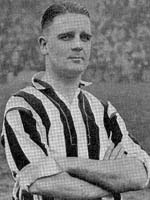Jesse Carver

Carver with Newcastle United.
|
|||
| Personal information | |||
|---|---|---|---|
| Date of birth | 7 July 1911 | ||
| Place of birth | Liverpool, England | ||
| Date of death | 29 November 2003 (aged 92) | ||
| Place of death | Bournemouth, England | ||
| Playing position | Centre back | ||
| Senior career* | |||
| Years | Team | Apps | (Gls) |
| 1929–1936 | Blackburn Rovers | 146 | (0) |
| 1936–1939 | Newcastle United | 70 | (0) |
| Teams managed | |||
| 1946 | Xerxes | ||
| 1947–1948 | Netherlands | ||
| 1949–1951 | Juventus | ||
| 1952–1953 | West Bromwich Albion | ||
| 1953 | Lazio | ||
| 1953–1954 | Torino | ||
| 1954–1955 | Roma | ||
| 1955–1956 | Coventry City | ||
| 1956–1957 | Lazio | ||
| 1957–1958 | Internazionale | ||
| 1959–1960 | Genoa | ||
| 1961 | Lazio | ||
| 1962–1963 | APOEL | ||
| 1969–1970 | APOEL | ||
| * Senior club appearances and goals counted for the domestic league only. |
|||
Jesse Carver (7 July 1911 - 29 November 2003) was an English footballer, best remembered for his enlightened management of some of Europe's finest clubs.
Carver started out in football as a player, joining Blackburn Rovers as an 18-year-old groundstaff boy and spent seven years at Ewood Park, becoming the first choice centre-half in 1931, playing almost 150 games for the First Division side. Although under six foot and short for a stopper his strong tackling and intelligent reading of the game more than made up for his lack of inches. In 1936, he joined Newcastle United for £2,000, making his debut against Barnsley in August, and with Carver playing the Toon's highest finish was 4th in the Second Division. After playing 70 times in the league and 6 in the FA Cup between 1936-39 for Newcastle United, Carver's playing career was cut short by the Second World War. During the war years, he worked as a policeman.
After the war, Carver became assistant trainer at Huddersfield, and he began to realise that he had more talent as a coach than as a player. He successfully applied to coach Dutch club Xerxes in Rotterdam. He built his training routines around using the ball, instead of boring repetitive lapping, Xerxes flourished, and heading the championship and he was asked to coach the national team, a position he held for two years.
After one season coaching at Millwall, he was appointed trainer to the England ‘B’ team on the successful 1949 tour of Holland & Finland. A job at the FA looked likely but as the FA hesitated, Juventus jumped in and offered him the coach’s job. He led Juve to the championship in his first season at the Turin club.
...
Wikipedia
